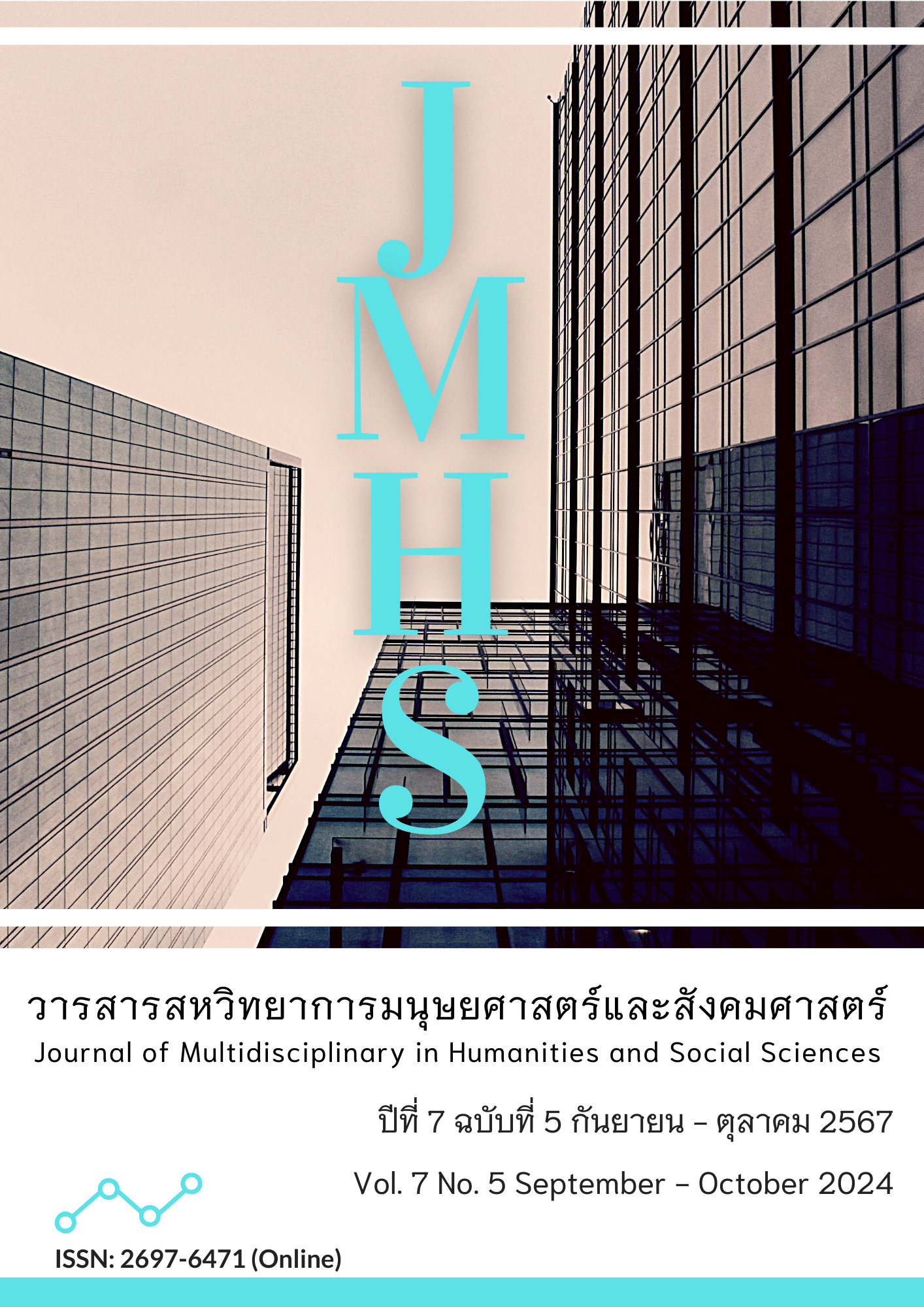The Curriculum Development of Instructional Design for Preservice Special Education Teachers
Main Article Content
บทคัดย่อ
There is an urgent need for pre-service special education teachers to improve their teaching design ability. This study aimed to develop a curriculum for enhancing the instructional design ability and evaluate its effectiveness. The sample comprised 32 junior preservice special education teachers from Chongqing Normal University. The researchers employed a research and development approach to develop the curriculum and the process, including four stages: 1) basic information study; 2) curriculum development; 3) curriculum implementation; and 4) curriculum evaluation and improvement. The research results were found as follows:
1. After the curriculum implementation, the instructional design ability of preservice special education teachers was higher than before.
2. The instructional design ability of preservice special education teachers had been enhanced before, during, and after implementing the curriculum.
These findings underscore the significance of targeted curriculum interventions in bridging the gap between theoretical knowledge and practical application, ultimately fostering more effective instructional practices among preservice special education teachers.
Article Details

อนุญาตภายใต้เงื่อนไข Creative Commons Attribution-NonCommercial-NoDerivatives 4.0 International License.
ทัศนะและความคิดเห็นที่ปรากฏในวารสาร ถือเป็นความรับผิดชอบของผู้เขียนบทความนั้น และไม่ถือเป็นทัศนะและความรับผิดชอบของกองบรรณาธิการ
เอกสารอ้างอิง
Ackerman, P. L. (1996). A theory of adult intellectual development: Process, personality, interests, and knowledge. Intelligence, 22(2), 227-257.
Arı, İ. A., & Başer, D. (2022). Evaluation of preservice teachers' computer-based instructional materials by special education teachers. Journal of Ahmet Keleşoğlu Education Faculty, 4(2), 248-266.
Bloom, B. S. (1968). Learning for mastery. Evaluation Comment, 2(1), 1-11.
Brown, A. H., & Green, T. D. (2021). The essentials of instructional design: Connecting fundamental principles with process and practice (4th ed.). Routledge.
Brown, J., Collins, A., & Daguid, P. (1989). Situated cognition and the culture of learning. Educational Researcher, (1), 32-42.
Chen, W. (2013). An empirical study on the development of preservice English teachers’ instructional design competency under the perspective of ecological teaching. Distance Education in China, (7), 60-63.
Du, P. (2011). The development and reflection of basic teaching competency standards for contemporary elementary and secondary school teachers. Curriculum, Teaching material and method, 31(8), 95-100.
Evans, A. L., Bulla, A. J., & Kieta, A. R. (2021). The precision teaching system: A synthesized definition, concept analysis, and process. Behavior Analysis in Practice, 14(3), 559-576.
Everwijn, S. E., Bomers, G. B., & Knubben, J. A. (1993). Ability-or competence-based education: Bridging the gap between knowledge acquisition and ability to apply. Higher Education, 25, 425-438.
Forsling, K. (2019). Designs for learning: Focus on special needs. Designs for Learning, 11(1), 108–117.
Frey, N., Hattie, J., & Fisher, D. (2018). Developing assessment-capable visible learners, grades K-12: maximizing skill, will, and thrill. Thousand Oaks, California: Corwin.
Gallacher, T., & Johnson, M. (2019). “Learning Progressions”: A historical and theoretical discussion. Research Matters, (28), 10-16.
Guskey, T. R. (2007). Closing achievement gaps: Revisiting Benjamin S. Bloom's “Learning for mastery”. Journal of Advanced Academics, 19(1), 8-31.
Hardré, P. L., & Kollmann, S. (2013). Dynamics of instructional and perceptual factors in instructional design competence development. Journal of Learning Design, 6(1), 34–48.
Kollmann, S., & Hardré, P. L. (2013). Tools of the trade: The role of perceptions and context in designing and developing instructional learning aids. Journal of Applied Instructional Design, 3(1), 5–17.
Leeds-Hurwitz, W. (2009). Social construction of reality. SAGE.
Liu, J. (2012). A social constructivist perspective on the teaching of English in sports colleges. Journal of Northeast Normal University (Philosophy and Social Science Edition), (2), 181-184.
Ma, L., & Sheng, Q. L. (2016). Teacher’s development of instructional design ability. Hangzhou: Zhejiang University Press.
Massouti, A. (2021). Pre-service teachers’ perspectives on their preparation for inclusive teaching: Implications for organizational change in teacher education. The Canadian Journal for the Scholarship of Teaching and Learning, 12(1), 1-15.
Ostrowdun, C. P. (2020). Representations of inclusion: How pre-service teachers understand and apply inclusion across situations. Exceptionality Education International, 30(3), 102-123.
Qian, X. L., & Zou, X. (2009). A review of instructional systems design for special education: From segregation to integration. Chinese Journal of Special Education, 114(12), 12-17.
Robinson, D. (2017). Effective inclusive teacher education for special educational needs and disabilities: Some more thoughts on the way forward. Teaching and Teacher Education, 61, 164–178.
Sindelar, P. T., Brownell, M. T., & Billingsley, B. (2010). Special education teacher education research: Current status and future directions. Teacher Education and Special Education, 33(1), 8-24.
Taba, H. (1962). Curriculum development: Theory and practice. New York: Harcourt Brace and World.
Tang, Y. P. (2022). Curriculum design and practice of higher vocational special education major under the perspective of curriculum ideology—taking “Theory and practice of individualized education” as an example. Modern Vocational Education, (40), 84-86.
Thorius, K. A. K. (2016). Stimulating tensions in special education teachers’ figured world: An approach toward inclusive education. International Journal of Inclusive Education, 20(12), 1326–1343.
Tyler, R. (1949). Basic principles of curriculum and instruction. Chicago, IL: University of Chicago Press, Chicago.
Vygotsky, L. S., & Cole, M. (1978). Mind in society: Development of higher psychological processes. Harvard University Press.
Xu, Y. J., & Qu, Y. (2011). Instructional design: Principles and techniques. Beijing: Education Science Publishing House.
Zhang, J. H., Jin, S. H., & Chen, X. Z. (2004). The Development characteristics and influencing factors of Primary School Teachers’ Instructional Design Competency. Psychological Development and Education, (1), 59-63.
Zhang, W. J., & Yan, X. Q. (2021). Individualized education for special children: theory, planning, and implementation (3rd ed.). Chongqing: Chongqing University Press.


